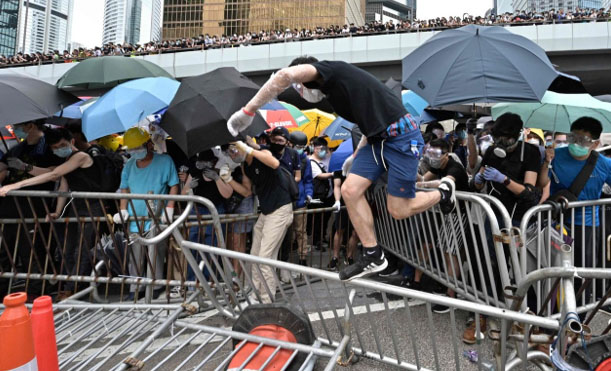by WorldTribune Staff, June 12, 2019
In a strong statement in support of massive demonstrations in Hong Kong, the U.S. State Department warned: “The continued erosion of the ‘one country, two systems’ framework puts at risk Hong Kong’s long-established special status in international affairs.”
Hundreds of police clashed with demonstrators on June 12, firing rubber bullets and tear gas after crowds surrounded the city’s main government compound to protest against a controversial new extradition law.

The protests, which followed a demonstration on June 9 by up to a million people, “is the biggest outbreak of public unrest in years and comes as the administration of Chinese leader Xi Jinping moves to bring the former British colony closer to the mainland,” the Wall Street Journal reported.
The protest happened “right at the foot of the local headquarters of China’s People’s Liberation Army,” the Wall Street Journal noted, adding “the images of thousands once again paralyzing city streets is a potential embarrassment for Mr. Xi.” The Chinese supreme leader “has shown zero tolerance for anti-national sentiment in regions such as Xinjiang and Hong Kong.”
Xi will likely see the protests as a challenge to his authority and push the government in Hong Kong harder to pass the legislation, said Steve Tsang, director of the China Institute at the London-based School of Oriental and African Studies.
“Neither the government in Hong Kong nor that in China is likely to accept they have made a mistake in introducing these laws,” he said.
Beijing promised to safeguard Hong Kong people’s rights and freedoms until 2047, but in recent years authorities in the city have jailed activists, used the courts to disqualify democratically elected opposition lawmakers, expelled a foreign journalist and banned a political party that advocated Hong Kong independence.
Opponents of the extradition legislation say the bill would pave the way for fugitives to be sent to mainland China, where many legal experts believe suspects will not receive a fair trial given the Communist Party’s control over the courts.
The legislation “could damage Hong Kong’s business environment and subject our citizens residing in or visiting Hong Kong to China’s capricious judicial system,” U.S. State Department spokesperson Morgan Ortagus said.
The UK has also raised alarms over the move. “We are concerned about potential effects of these proposals, particularly obviously given the large number of British citizens there in Hong Kong,” British Prime Minister Theresa May said.
The extradition legislation has been at the center of Hong Kong’s political debate in recent months as the Xi regime moved to plug what it calls a loophole exposed by a homicide case, the Nikkei Asian Review reported. The government was not able to transfer a Hong Kong man accused of killing his pregnant girlfriend in Taiwan because of the lack of an extradition agreement with the island. Hong Kong currently has extradition treaties with roughly 20 jurisdictions around the world, and mainland China, Taiwan and Macao are not among them.
Frances Eve, deputy director of research at Chinese Human Rights Defenders, criticized the lack of independence in China’s legal system.
“The Hong Kong government has legal obligations to protect human rights, which would be impossible if the planned amendments to the extradition bill go ahead,” Eve told the Nikkei Asian Review, adding that the government should “listen to the overwhelming chorus of voices” speaking out against the bill and “halt this undemocratic push.”
Intelligence Brief __________ Replace The Media
